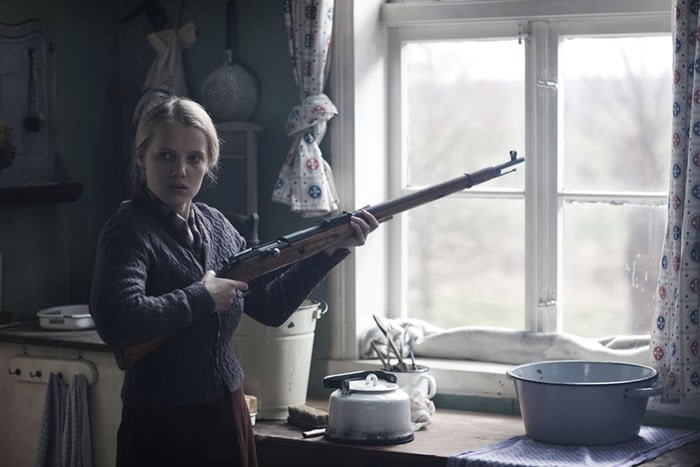What a cheat is this movie. It cheats us in its marketing (the bottom photo on the DVD cover is a false one) and in its telling, too. And whoever cast the leading actors certainly didn't try to make the older versions appear to have grown physically out of the their younger selves. That said (it's rather a lot, how-ever), REMEMBRANCE is for the most part well written, directed and acted. Watching it -- particularly the sections that take place during World War II, first in a concentration camp and then in wartime Poland -- is certainly attention holding, but it is a movie with which those of us who've seen countless Holocaust films already may have some trouble.
Let's start with the good stuff. The sections that tell of our two leading characters -- a Jewish German girl and a Polish partisan, both imprisoned in the camp -- are handled quite well. They are lively, impassioned and relatively realistic. Filmmaker Justice, shown at left, handles their escape attempt with real flair and the kind of style that does not call attention to itself but forces us to watch, breathless, as events pile up.
Our young man (Mateusz Damiecki, above) proves the very model of intelligence, courage and generosity, though his mom (Susanne Lothar, below, right, with Florian Lukas, as a friendlier-than-usual German officer) manages to bring to nasty life every negative we've heard about Poles and their anti-Semitism.
Mom's daughter-in-law (Joanna Kulig, below) more than makes up for this, however, as she offers help and encouragement in the face of what looks like very bad news. It's the modern-day story (set in 1976) and its unfurling that proves somewhat disappointing, particularly in comparison to what is taking place in 1944. (The filmmaker juggles the time frame so that we're constantly moving back and forth.)
Our girl Hannah has clearly made it out of Poland and to America, where she is happily married and living quite well. As played believably by Dagmar Manzel (below, who looks nothing like her younger self), she suddenly discovers that her concentration camp lover may still be alive, after believing him dead for 30 years.
This is one hell of a situation in which to find oneself, but what it does to Hannah's present day family (her husband is very well played by David Rasche, below) is barely explored, except that we note that everyone from wife to hubby to daughter is on tenterhooks and growing more annoyed.
The 1976 sections feel rushed and incomplete, and this keeps building, right up until the film's conclusion, which is frustrating in the extreme. Unless an immediate sequel was planned (that never happened), there is little excuse for this kind of filmmaking -- in which the entire point, the very thing we've been waiting for, is withheld from us. (If this were one of those "challenging" films by Michael Haneke or Asghar Farhadi, we might expect or at least more easily accept this kind of conclusion, but Remembrance is basically an "entertainment," as Graham Greene would have put it.)
There is a lot to enjoy and mull over in Remembrance, however. It certainly works (partially, anyway) as one of those "entertainments," while adding yet another tale to the myriad Holocaust stories we now know. The DVD has just arrived from Corinth Films, and you can order it here. Meanwhile, if you stream Netflix, you can also find it here.












2 comments:
I strongly disagree with your critique of the ending of this movie. It was exquisite, subtle, and deeply moving unlike so many movies which have a garish, predictable ending. This movie leaves you longing for what will come next, which is challenging, yes, but as it should be.
I guess we disagree on this one, Anon. The inability or maybe the lack of desire of the moviemaker to let us know what happens after the single event occurs that the entire movie has been leading up to smacks of high-toned sentimentality. If we don't learn what happens, we can then (and we surely will) paste our own happy-ending version of events onto the film. This places the responsibility with the viewer rather than with the creator -- where it belongs. It's the creative equivalent of having one's cake and eating it, too, while letting your audience go hungry.
Post a Comment